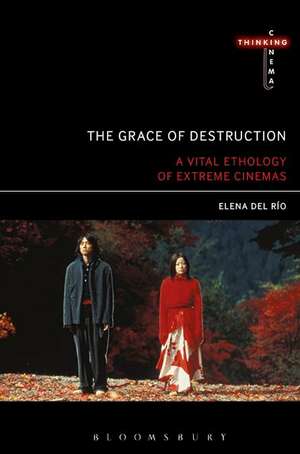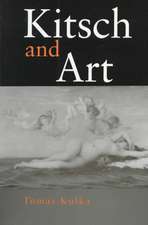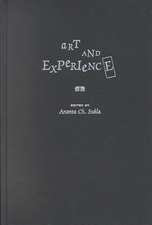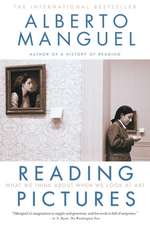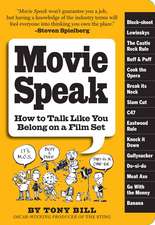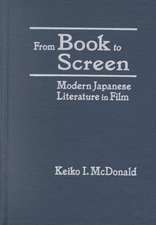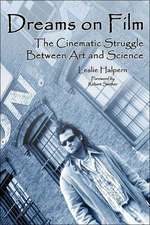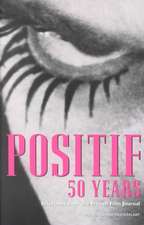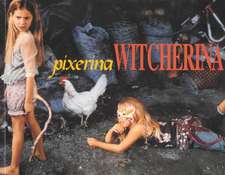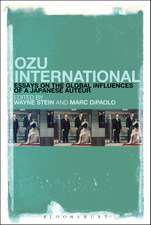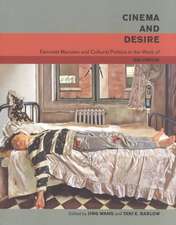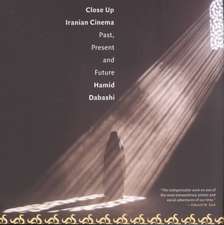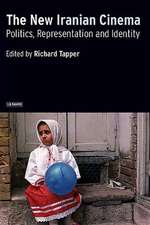The Grace of Destruction: A Vital Ethology of Extreme Cinemas: Thinking Cinema
Autor Elena del Ríoen Limba Engleză Paperback – 29 noi 2017
| Toate formatele și edițiile | Preț | Express |
|---|---|---|
| Paperback (1) | 238.01 lei 6-8 săpt. | |
| Bloomsbury Publishing – 29 noi 2017 | 238.01 lei 6-8 săpt. | |
| Hardback (1) | 774.12 lei 6-8 săpt. | +159.96 lei 6-12 zile |
| Bloomsbury Publishing – 4 mai 2016 | 774.12 lei 6-8 săpt. | +159.96 lei 6-12 zile |
Preț: 238.01 lei
Preț vechi: 272.93 lei
-13% Nou
Puncte Express: 357
Preț estimativ în valută:
45.54€ • 48.70$ • 37.97£
45.54€ • 48.70$ • 37.97£
Carte tipărită la comandă
Livrare economică 17 aprilie-01 mai
Preluare comenzi: 021 569.72.76
Specificații
ISBN-13: 9781501338212
ISBN-10: 1501338218
Pagini: 288
Dimensiuni: 229 x 154 x 28 mm
Greutate: 0.38 kg
Ediția:NIPPOD
Editura: Bloomsbury Publishing
Colecția Bloomsbury Academic
Seria Thinking Cinema
Locul publicării:New York, United States
ISBN-10: 1501338218
Pagini: 288
Dimensiuni: 229 x 154 x 28 mm
Greutate: 0.38 kg
Ediția:NIPPOD
Editura: Bloomsbury Publishing
Colecția Bloomsbury Academic
Seria Thinking Cinema
Locul publicării:New York, United States
Caracteristici
Discusses well-known films and directors, such as Rainer W. Fassbinder, Samuel Fuller, Michael Haneke, Takeshi Kitano, David Lynch, Carlos Reygadas, and Lars von Trier
Notă biografică
Elena del Río is Professor of Film Studies at the University of Alberta, Canada. Her essays have been featured in journals such as Camera Obscura, Discourse, Quarterly Review of Film and Video, Film-Philosophy, The New Review of Film and Television Studies, SubStance, and Deleuze Studies. She has also contributed essays to edited collections on the films of Atom Egoyan, Rainer W. Fassbinder, and on the philosophy of film, and Deleuze and cinema. She is the author of Deleuze and the Cinemas of Performance: Powers of Affection (2008).
Cuprins
AcknowledgmentsIntroduction: From Violence to Forces: Extreme Cinemas as Ethological ExperimentationChapter 1: The Disease of MoralityChapter 2: Bare LifeChapter 3: Physics of Violence, Folds of PainChapter 4: Ethology of DeathChapter 5: ExtinctionBibliographyIndex
Recenzii
Del Río's Grace of Destruction. [continues] to invigorate the conversation surrounding the new extreme cinema while also expanding the applicability of its terms in productive and challenging ways that particularly encourage us to consider the ethical and philosophical ramifications that only the extreme encounter can engender.
The exploration of how Deleuze's inflections of Nietzschean and Spinozan thought are brought out ... are precise, well-researched, pertinent and compelling. he philosophies are engaged with and pursued in rigorous fashion often via contemporary scholarly reworkings, which elicit surprising yet convincing conclusions ... The chapters are well linked and build neatly upon one another, but readers familiar with the book's philosophical touchpoints could nonetheless dive directly into individual chapters should they be so inclined.
[The Grace of Destruction]... is an inspiring and thought-provoking book that should appeal to a broad readership (interested in global film, film philosophy, cine-ethics, extreme cinemas, and politics) and is fit for an era when critically interrogating the habitual ways in which we think, live, and act (as citizens and a species) has never been more important.
Elena del Río's The Grace of Destruction is a remarkable book combining a passion for cinema that yields stunning critical insights with an acute theoretical genealogy of contemporary culture's moralism. Although thoroughly attuned to the most recent developments in Deleuzian philosophies of cinema and affect, and without being negatively reactive against the contemporary field of cinema studies, del Río's work manages to be breathtakingly original. Anyone interested in cinematic aesthetics and the radical potential of cinema as a mode of thought should read this book.
In her formidable new book, The Grace of Destruction, Elena del Río examines a corpus of violent, shocking, and ultimately extreme films-the very films that moralists might otherwise condemn-in order to mount furious critique of the transcendent values of modern morality. In conversation with Spinoza, Nietzsche, Deleuze, and Guattari, among others, The Grace of Destruction dares its readers to conceive of cinema as a vitalist ethics, but also to grasp ethics in the absence of humanism. A brave, uncompromising, and important book.
The exploration of how Deleuze's inflections of Nietzschean and Spinozan thought are brought out ... are precise, well-researched, pertinent and compelling. he philosophies are engaged with and pursued in rigorous fashion often via contemporary scholarly reworkings, which elicit surprising yet convincing conclusions ... The chapters are well linked and build neatly upon one another, but readers familiar with the book's philosophical touchpoints could nonetheless dive directly into individual chapters should they be so inclined.
[The Grace of Destruction]... is an inspiring and thought-provoking book that should appeal to a broad readership (interested in global film, film philosophy, cine-ethics, extreme cinemas, and politics) and is fit for an era when critically interrogating the habitual ways in which we think, live, and act (as citizens and a species) has never been more important.
Elena del Río's The Grace of Destruction is a remarkable book combining a passion for cinema that yields stunning critical insights with an acute theoretical genealogy of contemporary culture's moralism. Although thoroughly attuned to the most recent developments in Deleuzian philosophies of cinema and affect, and without being negatively reactive against the contemporary field of cinema studies, del Río's work manages to be breathtakingly original. Anyone interested in cinematic aesthetics and the radical potential of cinema as a mode of thought should read this book.
In her formidable new book, The Grace of Destruction, Elena del Río examines a corpus of violent, shocking, and ultimately extreme films-the very films that moralists might otherwise condemn-in order to mount furious critique of the transcendent values of modern morality. In conversation with Spinoza, Nietzsche, Deleuze, and Guattari, among others, The Grace of Destruction dares its readers to conceive of cinema as a vitalist ethics, but also to grasp ethics in the absence of humanism. A brave, uncompromising, and important book.
